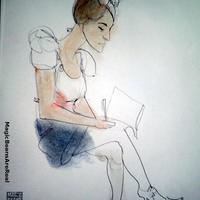Anastasia Kayiatos
Macalester College, Russian Studies, Faculty Member
- Russian Studies, Queer Theory, Russia, Disability Studies, Crip theory, Cripqueer Theory, and 33 moreCripqueer Critique, Post-Socialist Societies, Socialist and Post-Socialist Area Studies, Critical Post-Socialist Studies, Affect (Cultural Theory), Affect/Emotion, Affect Theory, Queer Studies, Queer Theory (Literature), Queer, Cold War, Art and Aesthetics of the Cold War, Socialist Realism, Bodyart, Body in Performance, Performance Studies, Women's Studies, Gender and Sexuality, Critical Race Theory, Animacy, Slavic Languages and Literatures, Gay And Lesbian Studies, Critical Theory, Queer temporality, Dance, Dance Studies, GULAG, Soviet Dissent, Post-Communist Studies, Новое литературное обозрение (НЛО), Development Studies, Loneliness, and Spinster Studiesedit
- NB. This account was reborn after being hacked, taking with it my entire network. Please add me (again) so I can foll... moreNB. This account was reborn after being hacked, taking with it my entire network. Please add me (again) so I can follow you. (Also, my CV is hyperlinked.)
In a nutshell--albeit not-the most-affectively-academic one--here's me profiled by The Mac Weekly. (The formal "about" follows.) http://themacweekly.com/2013/10/proftalk-anastasia-kayiatos-on-russian-but-no-tolstoyevsky/
Anastasia Kayiatos earned a Slavic and Women’s Studies PhD in 2012 from UC Berkeley, where she also co-ran the working groups Socialisms & Sexualities and Doing Disability. Last year, Anastasia was a provost's postdoc at USC. This year she started as Visiting Professor in Russian, Women's Studies, and Critical Theory at Macalester College, and has offered courses so far like, "The Cold War Gets Hot" and "Camp, Kitsch and Poshlost': The Making of Modern (Bad) Taste." Selections from her dissertation on silence and alterity in post-Stalin Russia have made multilingual appearances in multiple journals, most notably a pair in Women’s Studies Quarterly and Theatre Survey on queer deaf pantomime in seventies' Moscow, and a recent piece on the sexy perversity of post-socialist conversions to capitalism, called “Shock and Alla." As she toils away for a while on a book manuscript about silent performances of sexual difference in the Soviet Union--tentatively titled Suggestive Gestures: Toward a Queer Socialist Aesthetic--Prof. Kayiatos derives more incremental pleasures from short-term projects, including a collaborative article on the queer viral politics of Pussy Riot; a queer/crip/performance studies piece on the specificity of late-Soviet “play”; and a volume of conference proceedings from Worlds of Wonder: The Queerness of Childhood, with Professor Anna Fishzon.edit
Research Interests:
Research Interests:
Research Interests:
Taking as its theme the unsayable and the unsaid in post-Stalin Russia, this interdisciplinary dissertation pushes scholars to see more of the Soviet experience than the usual `totalitarianism' lens would allow. Its six chapters apply... more
Taking as its theme the unsayable and the unsaid in post-Stalin Russia, this interdisciplinary dissertation pushes scholars to see more of the Soviet experience than the usual `totalitarianism' lens would allow. Its six chapters apply pressure to the cold war repressive hypothesis that casts the whispering citizens of Stalin's Russia as restored to speech during Khrushchev's cultural thaw only to be muted once more in the late sixties by political stagnation. The prevalence of this view in Russian cultural studies and national collective memory has rendered it rather difficult to write about late socialism until recently, when scholars started to take a multisensory approach to the Soviet past--not only listening to the verbal narratives of the era (whether official or dissenting), but also looking at the dynamic tensions between socialist speech and the socialist body. To counter the commonplace of Soviet history that makes quiet consonant with submission or complicity, this study attends instead to the manners in which Soviet subjects opted for silence to speak truth to power, as with the Aesopian gestural language of avant-garde pantomimists. It also pursues the wily ways that subjects presumed or produced as unspeaking or unspeakable--including the deaf-mute, the racial primitive, the sexual deviant, and the illiterate criminal--performed the silences imputed to them to say something else and, so doing, improvised interesting and unexpected scripts for late socialism.
Doctoral Dissertation in Slavic Languages & Literatures/Designated Emphasis in Women, Gender, & Sexuality Studies
UC Berkeley, August 2012
Advisor/Supervisor/Committee Chair: Eric Naiman and Mel Y. Chen
Committee Members: Olga Matich and Alexei Yurchak
*This dissertation is copyrighted, and will appear on the ProQuest database in December 2014, following a two-year release delay.
Doctoral Dissertation in Slavic Languages & Literatures/Designated Emphasis in Women, Gender, & Sexuality Studies
UC Berkeley, August 2012
Advisor/Supervisor/Committee Chair: Eric Naiman and Mel Y. Chen
Committee Members: Olga Matich and Alexei Yurchak
*This dissertation is copyrighted, and will appear on the ProQuest database in December 2014, following a two-year release delay.
Research Interests:
A television documentary on speech therapy is visible on the screen. A logopedist (speech-defect expert) coaches a young man to overcome his stutter through hypnosis. “You will speak loudly and clearly, freely and easily, unafraid of your... more
A television documentary on speech therapy is visible on the screen. A logopedist (speech-defect expert) coaches a young man to overcome his stutter through hypnosis. “You will speak loudly and clearly, freely and easily, unafraid of your voice and your speech,” she instructs. The boy hesitates but finally musters the words: “I can speak.” Thus Andrei Tarkovsky begins Zerkalo [Mirror], his poetic film about personal memory and cultural trauma (conceived in 1964 and completed in 1974). The symbolism of this scene was impossible for Tarkovsky's Soviet intelligentsia audience to miss. The stutterer coming to speech allegorized the artist coming to free expression in Russia after Stalin, struggling to adapt to alternating intervals of liberating “thaw” and oppressive “freeze,” fluency and silence, in the period of de-Stalinization that Nikita Khrushchev's secret speech at the 20th Party Congress of 1956 set into motion. The crisis of the solo stutterer's speech in the film stood in for the larger emerging crisis of how to represent socialist reality, a world that once had been captured solely by socialist realism—that is, until Khrushchev deprived Stalinism of its status as real socialism and thus invalidated the basis of socialist realism.
